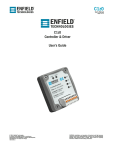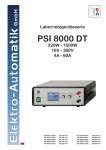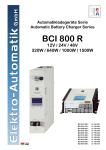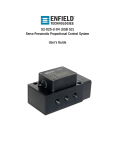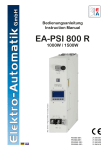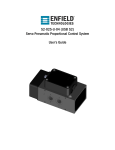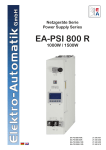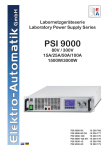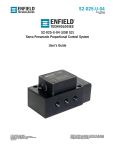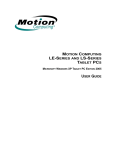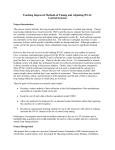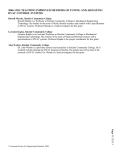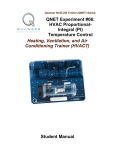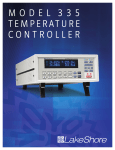Download LS-C41 User`s Manual
Transcript
LS-C41 High Performance Analog PID Controller User’s Guide User’s Guide LS-C41 High Performance Analog PID Controller Page 1 of 25 Contents Warnings & Notices Overview Physical Components and Layout Factory Setting Position Quick Start Guide Power Connection Command Feedback Valve Tubing and Configurations Potentiometers Screw Terminals Switches Controller Configurations User Interface Test Points Mezzanine Printed Circuit Board Integral Anti-Windup and Reset Driver Disable/Enable Dither Frequency and Amplitude Dead band Elimination Installation and Removal Troubleshooting rev 20100312 Copyright © 2004-2010 Enfield Technologies, LLC 2 3 4 5 6 7 8 9 10 11 12 13 14 15 16 17 18 19 20 20 21 23 Proprietary & Confidential User’s Guide LS-C41 High Performance Analog PID Controller Page 2 of 25 Warnings & Notices WARNING: Installation and operation of electric and high pressure systems (fluids and compressed gas) involves risk including property damage and personal injury or death. Installers and users should be properly trained or certified and take safety precautions. This product may cause death, personal injury, or property damage if improperly used or installed. The information in this document and other information from Enfield Technologies and its authorized representatives are intended for use by persons having technical expertise in selecting and using these products. Product owners (“you”) should analyze all technical and safety requirements of your specific application, including the consequences of any possible failure, before selecting a product. This product may not be suitable for all applications, such as those acting upon people. Suitability is solely your responsibility. Because the requirements for each application may vary considerably, you are solely responsible for conducting any testing or analysis that may be required to determine the suitability of the product for your application, and to ensure that all performance, safety and warning requirements for your application are met. Caution: While the product is low voltage, it is an open-frame electronic component and care should be taken to prevent unintentional contact with the product to avoid damage to person or property. The LS-C41 is an electro-static sensitive device. Use appropriate electro-static discharge (ESD) procedures during handling and installation. Notice: Use and purchase of this product is subject to Enfield Technologies’ Terms and Conditions of Sale and Use. Improper installation or use voids warranty. Consult factory regarding special applications. Specifications are subject to change. Reasonable efforts have been made to provide useful and correct information in this document, but this document may contain errors and omissions, and it is subject to change. Contact: Enfield Technologies 35 Nutmeg Drive Trumbull, CT 06611 USA +1 203 375 3100 +1 800 504 3334 toll free North America [email protected] www.enfieldtech.com rev 20100312 Copyright © 2004-2010 Enfield Technologies, LLC Proprietary & Confidential User’s Guide LS-C41 High Performance Analog PID Controller Page 3 of 25 Overview The LS-C41 is a complete, high-speed, high-accuracy analog control solution for use with Enfield Technologies LSSeries pneumatic valve products. The LS-C41 can provide a ‘Nested Loop’ control architecture for implementation where complex control solutions are required. The main loop or outer loop incorporates a flexible Proportional Integral Derivative control with an optional and selectable Feed-Forward path. There are several control configurations available by adjusting gains or through DIP switch settings. All input signals are true differential inputs and have common mode limits that extend beyond the onboard power supply of ±12V. The input signals for control command (CMD) and all feedback (FBK & AUX) signals must be coordinated (for example; CMD and FBK must both be on a 0-10V format). An efficient PWM-based valve drive is built in to provide the necessary ±1A required to position the LS-Series valve. On-board DC/DC converters allow for a single power supply connection of 24VDC. This power supply is protected to prevent damage if the power supply connections are reversed. rev 20100312 Copyright © 2004-2010 Enfield Technologies, LLC Proprietary & Confidential User’s Guide LS-C41 High Performance Analog PID Controller Page 4 of 25 Physical Characteristics and Component Layout The device controller measures 5.25” x 3.92”. There are four (4) mounting holes aligned in the corners of the device located 4.85” x 3.60” on center and in a rectangular format. A component placement diagram is shown below. Figure 1 – Component Placement Diagram rev 20100312 Copyright © 2004-2010 Enfield Technologies, LLC Proprietary & Confidential User’s Guide LS-C41 High Performance Analog PID Controller Page 5 of 25 Factory Settings Receipt Inspection & Shipping CAUTION: ELECTRO-STATIC SENSITIVE DEVICE; USE APPROPRIATE ESD HANDLING PROCEDURES DURING HANDLING AND INSTALLATION. Upon receipt, ensure the packaging is intact including the Electro-static Sensitive Device (ESD) sticker and packaging. The Device Controller is shipped configured as shown in Tables 1 and 2 (below): Designation RP1 RP2 RP3 RP4 PCB Label Kp Ki Kd Kff RP5 DB RP6 RP7 Damp DFrq Description Initial Setting Proportional Gain Adjustment Integral Gain Adjustment Derivative Gain Adjustment Feed-Forward Gain Adjustment Magnitude of Dead-Band Compensation Dither Amplitude Adjustment Dither Frequency Adjustment 2.0 V/V 0.0 V/V-s 0.0 V-s/V 0.0 V/V 0% Approximately 100mApp Approximately 1 kHz Table 1 – Factory Potentiometer Settings Designation SW1 Function Derivative Input Select, Integrator Enable/Disable SW2 Control Effort Select SW3 Feed-Forward Input Select Initial Setting SW1-1: Off SW1-2: Off SW1-3: Off SW1-4: On SW2-1: On SW2-2: Off SW3-1: Off SW3-2: Off Table 2 – Factory Switch Settings The factory settings result in a P-type controller configuration (see figures 2 and 3) with a proportional gain of 2.0 V/V. rev 20100312 Copyright © 2004-2010 Enfield Technologies, LLC Proprietary & Confidential User’s Guide LS-C41 High Performance Analog PID Controller Page 6 of 25 Position System Quick Start Guide Power Connection Figure 2 – Standard Position System Setup Figure 3 – Power Connection Power Indication LEDs System Status System Is Power Correctly Reverse Polarity Solution: Switch power and ground wires going into TB1 Power not Connected Solution: Ensure power is properly connected Table 3 – Power Indication LEDs rev 20100312 Copyright © 2004-2010 Enfield Technologies, LLC Proprietary & Confidential User’s Guide LS-C41 High Performance Analog PID Controller Page 7 of 25 For more information see the user interface section of the manual. rev 20100312 Copyright © 2004-2010 Enfield Technologies, LLC Proprietary & Confidential User’s Guide LS-C41 High Performance Analog PID Controller Page 8 of 25 Command Desired Input Type Wiring Configuration Differential Input Single Ended Input Note: Insert Jumper Between Ground and ‘Command –‘ Table 4 – Command Signal Configurations To verify that the command input has been connected correctly, measure the voltage at TP1 with reference to ground. For more information as well as the location of the test points see Figure 8. rev 20100312 Copyright © 2004-2010 Enfield Technologies, LLC Proprietary & Confidential User’s Guide LS-C41 High Performance Analog PID Controller Page 9 of 25 Position Feedback Company Feedback Configuration Note: Configuration Shown with Enfield Technologies’ LS-Cable. Insert Jumper Between Ground and ‘Feedback –‘ Note: Configuration Shown with Enfield Technologies’ LS-Cable. Insert Jumper Between Ground and ‘Feedback –‘ Note: Configuration Shown with Balluff Cable. Insert Jumper Between Ground and ‘Feedback –‘ Table 5 – Feedback Signal Configurations rev 20100312 Copyright © 2004-2010 Enfield Technologies, LLC Proprietary & Confidential User’s Guide LS-C41 High Performance Analog PID Controller Page 10 of 25 To verify that the feedback input has been connected correctly, measure the voltage at TP2 with reference to ground. For more information as well as the location of the test points see Figure 8. Valve Tubing and Cable Configurations Tubing Configuration M8 Valve Cable Configuration Table 6 – Valve Tubing and Cable Configurations rev 20100312 Copyright © 2004-2010 Enfield Technologies, LLC Proprietary & Confidential User’s Guide LS-C41 High Performance Analog PID Controller Page 11 of 25 Potentiometers All adjustments are by 25-turn potentiometers that are located on the right portion of the PCB (RP1 through RP7). The controller potentiometers (RP1-RP4) are on the middle-right and the valve-management potentiometers (RP5RP7) are located on the lower-right. The potentiometer adjustments are as shown in 7 below. Designation RP1 RP2 RP3 RP4 RP5 RP6 RP7 PCB Label Kp Ki Kd Kff DB DAmp DFrq Description Proportional Gain Adjustment – Range: 0.0 → 100.0 V/V Integral Gain Adjustment - Range: 0.0 → 100.0 V/V-s Derivative Gain Adjustment - Range: 0.0 → 1.0 V-s/V Feed-Forward Gain Adjustment - Range: 0.0 → 1.0 V/V Dead-Band Compensation – Range: 0% 25% Dither Amplitude Adjustment – Range: 0.0 to ±0.25A Dither Frequency Adjustment – Range: 10 Hz to 4 kHz Table 7 - Potentiometer Adjustments rev 20100312 Copyright © 2004-2010 Enfield Technologies, LLC Proprietary & Confidential User’s Guide LS-C41 High Performance Analog PID Controller Page 12 of 25 Figure 4 – Potentiometers Screw Terminals There are eight (8) 2-pin connectors and a single six (6) pin connector; connections to the device controller are made via screw terminals. The list of connections and designations are provided in 8 below. Designation PCB Label TB1 +PWR, PGND Pin 1: +24VDC Pin 2: PGND CMD Pin 1: + Command Pin 2: - Command FBK Pin 1: + Feedback Pin 2: - Feedback AUX Pin 1: + Auxiliary Pin 2: - Auxiliary CE Pin 1: + Control Effort Pin 2: - Control Effort Pin 1: + Motor Current M± Pin 2: - Motor Current +10V, +5V, Pin 1: + 10VDC Ref. AGND, Pin 2: + 5VDC Ref. -5V, Pins 3, 4: AGND -10V Pin 5: - 5VDC Ref. Pin 6: - 10VDC Ref. EN TB2 TB3 TB4 TB5 TB6 TB7 TB8 TB9 FF In TB10 INT BYPASS Pin Designation Pin 1: + Feed-Forward Pin 2: - Feed-Forward Description +24VDC Power Connection Differential Input Signal for Command Input Differential Input Signal for Feedback Input Differential Input Signal for Auxiliary Feedback Input Output Signal for Control Effort Level; Pin 2 is Common with AGND Output for Enfield Technologies LS-Series Valve Coil; PWM High Power Output; Reference Voltages for Sensor Excitation, Signal Input Source, or other uses. Low Current Output (10mA each). Short Pin 1 to Pin 2 to disable driver (see Driver Disable/Enable section) Single-ended FF input; Un-buffered; ±10V Short Pin 1 to Pin 2 to reset integrator. (see Integral AntiWindup and Reset section) Table 8 - External Connections and Designations rev 20100312 Copyright © 2004-2010 Enfield Technologies, LLC Proprietary & Confidential User’s Guide LS-C41 High Performance Analog PID Controller Page 13 of 25 rev 20100312 Copyright © 2004-2010 Enfield Technologies, LLC Proprietary & Confidential User’s Guide LS-C41 High Performance Analog PID Controller Page 14 of 25 Switches Three sets of DIP switches mounted on the PCB allow for a wide variety of control system configurations for a multitude of applications. The DIP switches and their functions are listed in Table 9. A brief description of the various control configurations is provided in the ‘Configuration’ section. Designation SW1 Function Derivative Input Select, Integrator Enable / Disable SW2 Control Effort Select SW3 Feed-Forward Input Select Description Switches 1-1 through 1-3 select the signal source for the derivative: SW1-1: Error; Used in PD and PID SW1-2: AUX; Used when the derivative of other inputs is beneficial SW1-3: FBK; Used if only feedback derivative is desired without the command input effect Switch 1-4 is used to bypass the integrator (I) in the PID controller: SW1-4: Integrator bypass; can be used to reset the time history of the integrator. It is also recommended to enable this switch when the integrator is not being used for control (for example, in a P or PD controller). Selects the signal source for the on-board valve driver: SW2-1: PID Output; Used for conventional PID SW2-2: Nested Loop Controller; Used when the Nested Loop Function is used Selects the signal source for the feed-forward: SW3-1: CMD; Used when control effort is directly proportional to the command input SW3-2: Aux FF; Used when the control effort is directly proportional to some other input signal. Table 9 - DIP Switch Configuration Settings Figure 6 – Switches rev 20100312 Copyright © 2004-2010 Enfield Technologies, LLC Proprietary & Confidential User’s Guide LS-C41 High Performance Analog PID Controller Page 15 of 25 Controller Configurations The LS-C41 Device Controller is extremely flexible; by configuring a selection of DIP switches and adjusting an array of potentiometers, a wide range of control and drive configurations can be selected. This section will address several of the different control architectures possible with this Device Controller. Other configurations may be possible and could be safely implemented; however, please consult the manufacturer prior to utilizing the Device Controller in any configuration not listed here. P-Type Proportional Control System (Factory Settings) PD-Type Proportional Derivative Control System PI-Type Proportional-Integral Control System Designation Position/Condition Notes SW1-1 Off Derivative Gain Not Needed SW1-2 Off Derivative Gain Not Needed SW1 SW1-3 Off Derivative Gain Not Needed SW1-4 On Integral Gain Not Needed SW2-1 On Aligns Proportional Output to Driver SW2 SW2-2 Off Not Required SW3-1 Off Not Required SW3 SW3-2 Off Not Required SW1-1 On Aligns Error to Derivative SW1-2 Off N/A SW1 SW1-3 Off N/A SW1-4 On Integral Gain Not Needed SW2-1 On Aligns Proportional Output to Driver SW2 SW2-2 Off Not Required SW3-1 Off Not Required SW3 SW3-2 Off Not Required SW1-1 Off N/A SW1-2 Off N/A SW1 SW1-3 Off N/A SW1-4 Off This will enable Integral Gain SW2-1 On Aligns Proportional Output to Driver SW2 SW2-2 Off Not Required SW3-1 Off Not Required SW3 SW3-2 Off Not Required PID-Type Proportional-IntegralDerivative Control System SW1 SW2 SW3 SW1-1 On SW1-2 SW1-3 SW1-4 SW2-1 SW2-2 SW3-1 SW3-2 Off Off Off On Off Off Off Aligns Error to Derivative to create a PID Controller N/A N/A This will enable Integral Gain Aligns Proportional Output to Driver Not Required Not Required Not Required Table 10 – Control Types rev 20100312 Copyright © 2004-2010 Enfield Technologies, LLC Proprietary & Confidential User’s Guide LS-C41 High Performance Analog PID Controller Page 16 of 25 User Interface The LS-C41 is equipped with four power indication LEDs as well as two status LEDs. Upon successful powering of the device, the PWR, +12V, and -12V green LEDs (located toward the center of the main circuit board) will light. If power connections were reversed, the red REV LED will be lit. Additionally, the both status LEDs (located toward the left-hand side of the main circuit board) will light green 1 for one second, after which they will light amber for one second. After this sequence, the states of these two LEDs describe the operation of the Device Controller, as outlined in Table 11. LD1 (top LED) Off Blinking Amber (Quickly) Blinking Green (Slowly) Any LD2 (bottom LED) Off Any Condition Normal Operation Short Circuit Fault Any Open Circuit Fault Green (Solid) Any Amber (Solid) Reference Voltage Error Symmetry fault Table 11 – Status LEDs Figure 7 - LEDs 1 Note: “Green” may be green, blue, or violet, based on current production. Likewise, “amber” may be amber, yellow, red, or orange. rev 20100312 Copyright © 2004-2010 Enfield Technologies, LLC Proprietary & Confidential User’s Guide LS-C41 High Performance Analog PID Controller Page 17 of 25 Test Points Several test points are provided on the Device Controller for tuning analysis and troubleshooting. Some test points will only be active under certain configurations (see later sections). Test Point TP1 Color Function WHT Command Input TP2 WHT Feedback Input TP3 TP4 ORG WHT Control Error Derivative Input TP5 TP6 TP7 TP8 TP9 TP10 TP11 TP12 YEL YEL YEL YEL WHT ORG ORG WHT ‘P’ Gain Output ‘I’ Gain Output ‘D’ Gain Output ‘FF’ Gain Output Dither Frequency PID + FF Output Control Effort #1 Auxiliary Input TP13 ORG Control Effort #2 TP14 WHT Coil Current TP15 TP16 TP17 TP18 WHT WHT RED BLK Dither Amplitude Dead Band +Vref AGND Description Command Input Level after the Differential Buffer; -10V to +10V Feedback Input Level after the Differential Buffer; -10V to +10V TP3 = TP1 – TP2; -10V to +10V Based on SW1 Settings – See PD Configuration; -10V to +10V TP5 = Kp * TP3; -10V to +10V TP6 = Ki * [Integral of TP3]; -10V to +10V TP7 = Kd * [Derivative of TP4]; -10V to +10V TP8 = Kff * TP1 or Kff * FF; -10V to +10V; Dither Frequency Status (0-5V range) Algebraically Summed Outputs of TP5, 6, 7, and 8 Analogous to Valve Input Level; -10V to +10V Auxiliary Input Level after the Differential Buffer; -10V to +10V Similar to TP11 After Scaling and Level-Shifting; 0V to +5V scale Coil Current Signal; 0 to +5V with 2.5V Reference; 2.0 V/A 0-250mApp amplitude; 0-5V range Dead Band Elimination Status; 0-25% (0-5V range) Positive Reference Voltage; 2.500V Nominal Analog Ground Connection Table 12 - Description of Test Points Available on the Device Controller rev 20100312 Copyright © 2004-2010 Enfield Technologies, LLC Proprietary & Confidential User’s Guide LS-C41 High Performance Analog PID Controller Page 18 of 25 Figure 8 – Test Points rev 20100312 Copyright © 2004-2010 Enfield Technologies, LLC Proprietary & Confidential User’s Guide LS-C41 High Performance Analog PID Controller Page 19 of 25 Mezzanine Printed Circuit boards The M2-V30-901 and M2-V30-903 boards (located on the lower left-hand corner of the main circuit board) are a key element in the LS-C41. These circuit boards provide power and driver functionality and have no user adjustments on them. These boards are installed to the main circuit board with 2-56 hardware for vibration resistance. Power is delivered to these boards via a flexible cable; the user must not tamper with this cable, as doing so will lead to unexpected operation of the Device Controller and any device attached to it. Figure 9 – Mezzanine Printed Circuit Boards rev 20100312 Copyright © 2004-2010 Enfield Technologies, LLC Proprietary & Confidential User’s Guide LS-C41 High Performance Analog PID Controller Page 20 of 25 Integral Anti-Windup The integral control circuit in the LS-C41 contains an anti-windup sub circuit which prevents the integrator from building up indefinitely when the control output becomes saturated. Additionally, the Device Controller contains an integrator reset switch (SW1-4), which resets the time history of the integrator when the user turns it on and then off. If SW1-4 is left in the “reset” or “on” position, or if TB10 is shorted, the integrator will remain disabled. The switch must be switched “off” in order for the integrator to be active. Remote Integral Reset The integral portion of the controller can be remotely reset by using a relay to short TB10 as shown below. WARNING: Do not attempt to ground TB10 or excite it with a voltage as this may cause permanent damage to the driver. Integral Enabled Integral Reset Figure 10 – Integral Reset Driver Disable/Enable The driver can be disabled by using a relay to short TB8 as shown below. WARNING: Do not attempt to ground TB8 or excite it with a voltage as this may cause permanent damage to the driver. Default Configuration Driver disabled by shorting TB8+ and TB8- Figure 11 – Driver Enable/Disable rev 20100312 Copyright © 2004-2010 Enfield Technologies, LLC Proprietary & Confidential User’s Guide LS-C41 High Performance Analog PID Controller Page 21 of 25 Dither Frequency and Amplitude The potentiometer dial marked RP6 DAmp provides a square wave dither with variable frequency (10 Hz to 4 kHz set by RP7 DFrq) to the valve spool. At its maximum setting (fully CW), a high pitched tone will be audible from the valve which is a high speed vibration added to the valve aperture gate (spool). The displacement of this vibration is so small and fast as to have an imperceptible affect on pressure or flow output. However, this dither helps minimize the effects of static friction in the spool and thus improves the system's overall performance. Deadband Elimination RP5 adjusted fully CCW. This is the factory default setting. This setting would make the valve resistant to small changes in command. RP5 adjusted to electrically remove deadband from the valve. By removing the deadband, the valve would be very sensitive to small changes in command. Table 13 – Deadband rev 20100312 Copyright © 2004-2010 Enfield Technologies, LLC Proprietary & Confidential User’s Guide LS-C41 High Performance Analog PID Controller Page 22 of 25 Installation & Removal W A R N I N G THESE PRODUCTS MAY CAUSE DEATH, PERSONAL INJURY, OR PROPERTY DAMAGE IF THEY ARE IMPROPERLY USED OR INSTALLED The information in this document and other information from Enfield Technologies and its authorized representatives are intended for use by persons having technical expertise in selecting and using these products. You should analyze all technical and safety requirements of your specific application, including the consequences of any possible failure, before selecting a product. These products are not suitable for all applications, such as applications related to or connected with aviation, aircraft, or aerospace. Because the requirements for each application may vary considerably, you are solely responsible for conducting any testing or analysis that may be required to determine the suitability of the product for your application, and to ensure that all performance, safety and warning requirements for your application are met. These products are subject to Enfield Technologies’ Limited Warranty which sets forth your sole and exclusive remedy in the event any products are defective in workmanship or material. Enfield Technologies shall have no liability for any property damage, personal injury, or other loss or damage (including incidental, special, and consequential damages) resulting from the improper selection, installation, or use of any product. The Device Controller is mounted in a plastic DIN housing; therefore, it can be directly mounted to a DIN rail. Alternatively, it can be mounted using 4-40 screws and suitable stand-offs. There are four (4) mounting holes aligned in the corners of the device located 4.85” x 3.60” on center and in a rectangular format. Install the Device Controller as follows: CAUTION: ELECTRO-STATIC SENSITIVE DEVICE; USE APPROPRIATE ESD HANDLING PROCEDURES DURING HANDLING AND INSTALLATION. Install the Device Controller on a DIN rail or using the four (4) mounting holes provided. Connect pneumatic valve to pneumatic system with appropriate port adapters and plumbing. Ensure that the valve is connected in such a way that the system is safe, even in the event of unexpected valve operation. Connect all signal and power connections to the appropriate connectors on the Device Controller. Connect the LS-Series cable to/from the LS-C41. When connecting a valve to the LS-C41, it should be done with the color convention shown in Table 13 (below): rev 20100312 Copyright © 2004-2010 Enfield Technologies, LLC Proprietary & Confidential User’s Guide LS-C41 High Performance Analog PID Controller Page 23 of 25 Wire Color Brown Blue Connection Point TB6-1: M+ TB6-2: M- Table 14 – Valve-Controller Connections Configure and tune the controller as required for specific application. Remove the Device Controller as follows: CAUTION: ELECTRO-STATIC SENSITIVE DEVICE; USE APPROPRIATE ESD HANDLING PROCEDURES DURING HANDLING AND INSTALLATION. Remove electrical power from the Device Controller. Disconnect all signal connections from the Device Controller. Remove product from DIN rail or remove the four (4) mounting screws. Package the Device Controller in appropriate ESD packaging (the original packaging is preferred). Start-Up & Shutdown Ensure that the valve is connected in such a way that the system is safe, even in the event of unexpected valve operation. Apply or remove electrical power to the Device Controller. Ensure that the valve is properly connected to the Device Controller on startup to ensure proper controller operation. Do not attempt to change the valve while power is applied to the Device Controller; if changing the valve connected to the Device Controller, follow these steps: o Ensure that your application will remain safe before making any change (powering down, removing valve, powering on, etc) even in the event of unexpected valve operation. o Remove power from the Device Controller. o Disconnect the valve from the Device Controller. o Connect the new valve to the Device Controller. o Apply Power to the Device Controller. Calibration & Periodic Maintenance The Device Controller does not require periodic calibration. Periodic tuning of the control system may be required due to physical changes (friction, machine and/or parts wear, etc) in the system under control. Keep the LS-C41 free from dirt, debris, and excessive moisture. Decommissioning & Corrective Maintenance The device controller is not serviceable in the field. If corrective maintenance is required, contact the manufacturer for return authorization; 1 800 504 3334. rev 20100312 Copyright © 2004-2010 Enfield Technologies, LLC Proprietary & Confidential User’s Guide LS-C41 High Performance Analog PID Controller Page 24 of 25 Troubleshooting 8 Most common problems or concerns: Power not applied properly, o Power supply not regulating/maintaining acceptable supply voltage levels o DC Common wires not connected; improperly connected Improper Tuning o “P” Gain at 0% Inverted polarity o Incorrect drive current cable wiring o Improper mechanical system connection Incorrect Feedback System Connection Incorrect/inadequate Command or Feedback signal Noise Improper Wiring Lack of DC Common reference Symptom Probable Causes Corrective Action System Totally Unresponsive Power Not Applied “P” Gain at 0.0% Apply Power, check all power wiring Increase “P” Gain Verify signal wiring and drive current wiring polarity; also verify mechanical system polarity and feedback sensor polarity Verify all wiring is as shown in application examples and as described in the “Installation” section of this document Inverted Polarity Signal Wiring System Mildly Responsive or Sluggish System ‘Pegs’ or ‘Rails’ Gain too low Increase “P” Gain Power supply voltage not stable No Feedback Signal Check power wiring; change power supply Connect Feedback Signal Verify all wiring is as shown in application examples and as described in the “Installation” section of this document Verify all wiring is as shown in application examples and as described in the “Installation” section of this document Increase Dither Amplitude Decrease “P” Gain Verify that large or high power machinery is not operating nearby. Also, verify input signal integrity by examining the signal with an oscilloscope. Verify all wiring is as shown in application examples and as described in the “Installation” section of this document Verify all DC common connections are as shown in application examples and as described in the “Installation” section of this document This is an artifact of the built-in dither and is intended to keep the electro-mechanical device in constant motion. If system performance remains satisfactory, Dither Amplitude may be adjusted to minimize or eliminate this sound. Feedback Connected Improperly System Fails to Converge or is Inaccurate Incorrect Wiring System Oscillates Electro-mechanical device requires dither Gain too high System ‘Buzzes’ Input Signal Noise (possibly 60Hz) Input Signals not connected DC Common not connected High Pitched Tone or Whine from Electro-mechanical device Dither Table 15 – Troubleshooting rev 20100312 Copyright © 2004-2010 Enfield Technologies, LLC Proprietary & Confidential

























